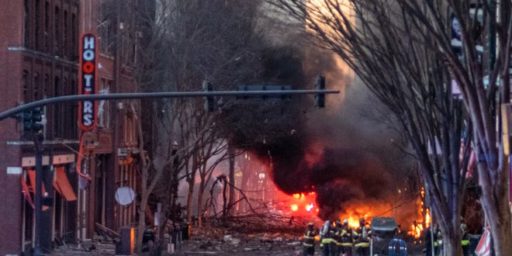Taguba Profile
WaPo’s feature on MG Antonio Taguba, “Lessons of a by-the-Book Soldier,” is worth a read. Not surprisingly, Taguba’s candor in yesterday’s hearings draws praise:
In their hunt for the facts about what happened at Abu Ghraib and why, the senators have heard many half-answers, nonresponses and promises to get back to them. Committee Chairman Sen. John Warner (R-Va.) tried to pin down Stephen Cambone, a senior Pentagon civilian in charge of military intelligence, by asking, “In simple and plain words, how do you think this happened?”
Cambone’s answer: “With the caveat, sir, that I don’t know the facts, it’s, for me, hard to explain.”
Warner put the same question to Taguba. “In simple words — your own soldier’s language — how did this happen?”
Taguba’s answer: “Failure in leadership, sir, from the brigade commander on down. Lack of discipline, no training whatsoever and no supervision. Supervisory omission was rampant. Those are my comments.”
The difference between a politician and a soldier, really. Most general officers–indeed, most military leaders, period–would have answered in a like manner.
This bit of background information is also revealing:
Taguba, 53, is the son of Sgt. Tomas Taguba, a Filipino who knew a thing or two about the abuse of prisoners, having escaped from Japanese custody during the infamous Bataan Death March during World War II. Tomas was serving in the Philippine Scouts when the islands fell, and after his escape spent three years spying on Japanese troop movements and relaying the information to U.S. forces. When Gen. Douglas MacArthur returned victorious, the senior Taguba joined the U.S. military.
His son was born in 1950 in Sampaloc, a district of Manila. Tony Taguba, as the general is known to friends, has told interviewers that he saw little of his father as a boy, but understood that’s the way it is for a soldier’s family. The Tagubas — Tony, his two brothers and five sisters — were upright, pious and disciplined: a well-ordered platoon.
In 1961, the family moved to Hawaii. Years later, when he became only the second Filipino American general, Taguba told AsianWeek that life in the United States “opened my mind to the capabilities and opportunities in America.” For him, the Army opened the door to those possibilities. It gave him an education, first through the ROTC program at Idaho State University and later at military and private colleges across the country. He has multiple master’s degrees.
An impressive background. Indeed, it always seems it’s the immigrants who have the quintesentially “American” experience.
It occcured to me yesterday, though, that his name will forever be linked in people’s minds with the Abu Ghraib scandal. One wonders if that’ll prevent his newfound acclaim from translating into advancement in the ranks.





Yesterday’s NYT profile seemed doubtful of the prospects of his advancement, given that he has never held a division command and that he has just been moved to “Deputy Assistant Secretary for Reserve Affairs.”
Yesterday’s NYT profile seemed doubtful of the prospects of his advancement, given that he has never held a division command and that he has just been moved to “Deputy Assistant Secretary for Reserve Affairs.”
Taguba is now so highly regarded in the Philippines that some news outfits want to elect him president!
I think it’s assured his potential as one of the Joint Chiefs in the future. Remember, he was tasked to investigate – he didn’t do that on his own. That he did it well and is now highly regarded by Congress as a result will ensure continued success for the good General, imho.
I don’t know whether MG Taguba’s comments will help or hurt him in the future. I suspect the latter. He has always been a single minded individual. In undergraduate school he was probably the most gung-ho cadet in our ROTC class and he was a “by the rules” kind of guy, no excuses, get the job done but always with an attitude of respect. Congress approves additional stars for general officer’s. General Officers are nominated by their respective superiors and by the president. A good officer has effectively been sent to the Gulag (DCG for Reserve Affairs) for telling the truth with candor and for doing his duty in a manner that has proven to be both personnally and professionally courageous.